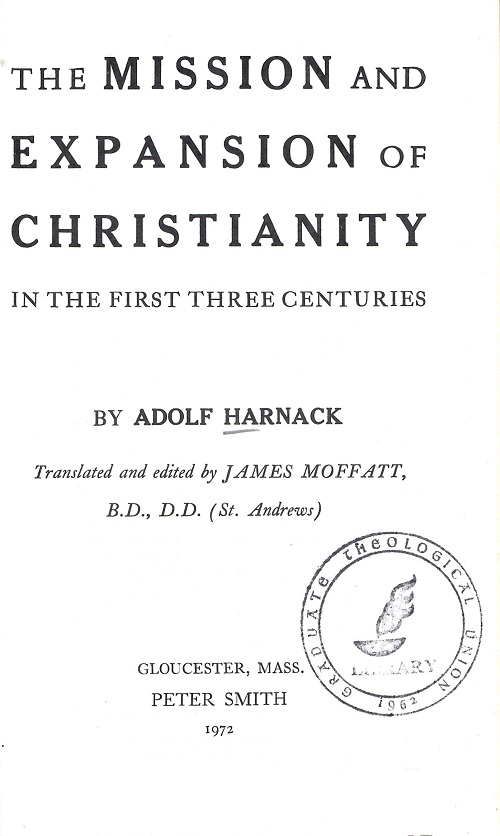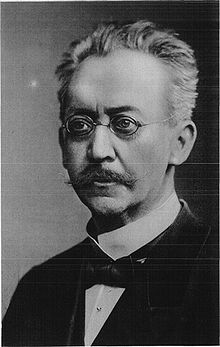

Conclusion
Hergenrother (Handbuch der allgem. Kirchengesch., i. pp. 109 f. has drawn up, with care and judgment, a note of twenty causes for the expansion of Christianity, together with as many causes which must have operated against it. The survey is not without value, but it does not clear up the problem. If the missionary preaching of Christianity in word and deed embraced all that we have attempted to state in Book II., and if it was allied to forces such as those which have come under our notice in Book III., then it is hardly possible to name the collective reasons for the success, or for the retardation, of the movement. Still less can one think of grading them, or of determining their relative importance one by one.
Finally, one has always to recollect not only the variety of human aptitudes and needs and culture, but also the development which the missionary preaching of Christianity itself passed through, between the initial stage and the close of the third century.
Reflecting more closely upon this last-named consideration, one realizes that the question here has not been correctly put, and also that it does not admit of any simple, single answer. At the opening of the mission we have Paul and some anonymous apostles. They preach the unity of God and the near advent of judgment, bringing tidings to mankind of Jesus Christ, who had recently been crucified, as the Son of God, the Judge, the Saviour.
Almost every statement here seems paradoxical and upsetting. Towards the close of our epoch, there was probably hardly one regular missionary at work. The scene was occupied by a powerful church with an impressive cultus of its own, with priests, and with sacraments, embracing a system of doctrine and a philosophy of religion which were capable of competing on successful terms with any of their rivals.
This church exerted a missionary influence in virtue of her very existence, inasmuch as she came forward to represent the consummation of all previous movements in the history of religion. And to this church the human race round the basin of the Mediterranean belonged without exception, about the year 300, in so far as the religion, morals, and higher attainments of these nations were of any consequence.
The paradoxical, the staggering elements in Christianity were still there. Only, they were set in a broad frame of what was familiar and desirable and “ natural ”; they were clothed in a vesture of mysteries which made people either glad to welcome any strange, astonishing item in the religion, or at least able to put up with it.1
Thus, in the first instance at any rate, our question must not run, “How did Christianity win over so many Greeks and Romans as to become ultimately the strongest religion in point of numbers?” The proper form of our query must be, “How did Christianity express itself, so as inevitably to become the religion for the world, tending more and more to displace other religions, and drawing men to itself as to a magnet ? ”
For an answer to this question we must look partly to the history of Christian dogma and of the Christian cultus. For the problem does not lie solely within the bounds of the history of Christian missions, and although we have kept it in view throughout the present work, it is impossible within these pages to treat it exhaustively.
One must first of all answer this question by getting some idea of the particular shape assumed by Christianity as a missionary force about the year 50, the year 100, the year 150, the year 200, the year 250, and the year 300 respectively, before we can think of raising the further question as to what forces may have been dominant in the Christian propaganda at any one of these six epochs.
Neither, of course, must we overlook the difference between the state of matters in the East and in the West, as well as in several groups of provinces. And even were one to fulfil all these preliminary conditions, one could not proceed to refer to definite passages as authoritative for a solution of the problem.
All over, one has to deal with considerations which are of a purely general character. I must leave it to others to exhibit these considerations— with the caveat that it is easy to disguise the inevitable uncertainties that meet us in this field by means of the pedantry which falls back on rubrical headings. The results of any survey will be trustworthy only in so far as they amount to such commonplaces as, eg., that the distinctively religion; element was a stronger factor in the mission at the outset thar at a later period, that a similar remark applies to the charitable and economic element in Christianity, that the conflict wit theism attracted some people and offended others, that tl may be said of the rigid morality, and so forth.
From the very outset Christianity came forward with a spirit of universalism, by dint of which it laid hold of the entire life of man in all its functions, throughout its heights and depths, in all its feelings, thoughts, and actions. This guaranteed its triumph. In and with its universalism, it also declared that the Jesus whom it preached was the Logos. To him it referred everything that could possibly be deemed of human value, and from him it carefully excluded whatever belonged to the purely natural sphere. From the very first it embraced humanity and the world, despite the small number of the elect whom it contemplated. Hence it was that those very powers of attraction, by means of which it was enabled at once to absorb and to subordinate the whole of Hellenism, had a new light thrown upon them. They appeared almost in the light of a necessary feature in that age. Sin and foulness it put far from itself. But otherwise it built itself up by the aid of any element whatsoever that was still capable of vitality (above all, by means of a powerful organization). Such elements it crushed as rivals and conserved as materials of its own life. It could do so for one reason—a reason which no one voiced, and of which no one was conscious, yet which every truly pious member of the church expressed in his own life. The reason was, that Christianity, viewed in its essence, was something simple, something which could blend with coefficients of the most diverse nature, something which, in fact, sought out all such coefficients. For Christianity, in its simplest terms, meant God as the Father, the Judge and the Redeemer of men, revealed in and through Jesus Christ.
And was not this religion bound to conquer? Alongside of other religions it could not hold its own for any length of time ; still less could it succumb. Yes, victory was inevitable. It had to prevail. All the motives which operated in its extension are as nothing when taken one by one, in face of the propaganda which it exercised by means of its own development from Paul to Origen, a development which maintained withal an exclusive attitude towards polytheism and idolatry of every kind.
1 Alongside of the church in its developed form, one man may perhaps be mentioned who did more than all the rest put together for the mission of Christianity among the learned classes, not only during his lifetime, but still more afte: his death. I mean Origen. He was the “Synzygus” of the Eastern church if the third century. The abiding influence of the man may be gathered, tw< centuries after he died, from the pages of Socrates the church historian. Hi domiciled the religion of the church in Hellenism (for thinkers and culturei people), so far as such a domicile was possible.